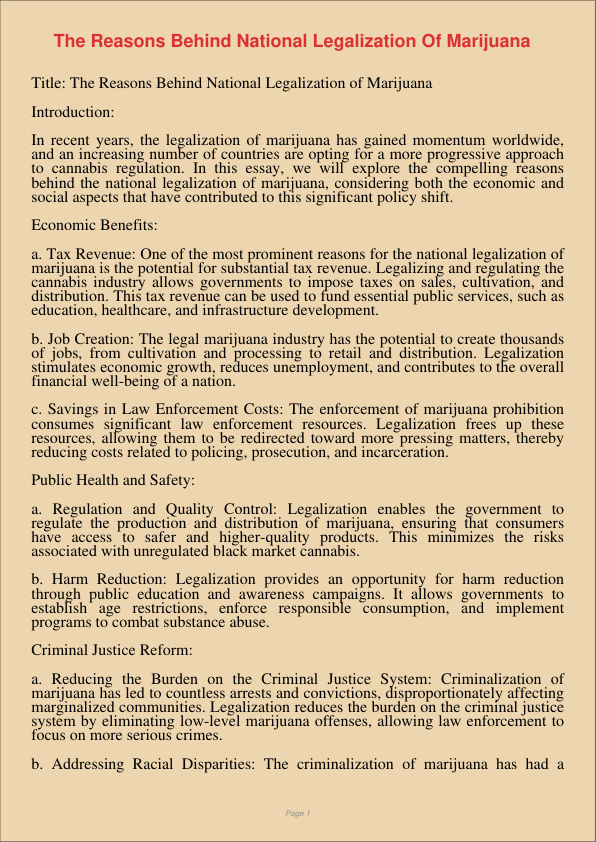Title: The Reasons Behind National Legalization of Marijuana
Introduction:
In recent years, the legalization of marijuana has gained momentum worldwide, and an increasing number of countries are opting for a more progressive approach to cannabis regulation. In this essay, we will explore the compelling reasons behind the national legalization of marijuana, considering both the economic and social aspects that have contributed to this significant policy shift.
Economic Benefits:
a. Tax Revenue: One of the most prominent reasons for the national legalization of marijuana is the potential for substantial tax revenue. Legalizing and regulating the cannabis industry allows governments to impose taxes on sales, cultivation, and distribution. This tax revenue can be used to fund essential public services, such as education, healthcare, and infrastructure development.
b. Job Creation: The legal marijuana industry has the potential to create thousands of jobs, from cultivation and processing to retail and distribution. Legalization stimulates economic growth, reduces unemployment, and contributes to the overall financial well-being of a nation.
c. Savings in Law Enforcement Costs: The enforcement of marijuana prohibition consumes significant law enforcement resources. Legalization frees up these resources, allowing them to be redirected toward more pressing matters, thereby reducing costs related to policing, prosecution, and incarceration.
Public Health and Safety:
a. Regulation and Quality Control: Legalization enables the government to regulate the production and distribution of marijuana, ensuring that consumers have access to safer and higher-quality products. This minimizes the risks associated with unregulated black market cannabis.
b. Harm Reduction: Legalization provides an opportunity for harm reduction through public education and awareness campaigns. It allows governments to establish age restrictions, enforce responsible consumption, and implement programs to combat substance abuse.
Criminal Justice Reform:
a. Reducing the Burden on the Criminal Justice System: Criminalization of marijuana has led to countless arrests and convictions, disproportionately affecting marginalized communities. Legalization reduces the burden on the criminal justice system by eliminating low-level marijuana offenses, allowing law enforcement to focus on more serious crimes.
b. Addressing Racial Disparities: The criminalization of marijuana has had a disproportionate impact on communities of color. Legalization can help address these racial disparities in the criminal justice system by eliminating racially biased arrests and convictions.
Public Opinion and Social Acceptance:
a. Changing Social Attitudes: Over time, public attitudes toward marijuana have shifted. A growing number of people view marijuana use as a personal choice, and they support efforts to end the criminalization of this substance. National legalization reflects the changing social consensus on marijuana use.
b. Reducing Stigma: Legalization contributes to the reduction of stigma associated with marijuana use, making it easier for individuals with medical conditions to access treatment and for recreational users to consume responsibly.
International Relations and Trade:
a. Global Trends: As other nations move toward marijuana legalization, there is an increasing international pressure to align drug policies with global trends. National legalization allows countries to participate in the international cannabis trade, opening up new opportunities for economic growth and cooperation.
b. Reducing Illegal Drug Trade: Legalizing marijuana can help curb the illegal drug trade by providing legal alternatives to black market cannabis. This can have positive effects on national and international security.
Conclusion:
The national legalization of marijuana is driven by a combination of economic, public health, criminal justice reform, changing social attitudes, and international considerations. As more countries recognize the potential benefits of legalization, it is likely that this trend will continue to grow. While challenges and concerns remain, the reasons behind the national legalization of marijuana are rooted in a pragmatic approach to regulation and policy that seeks to balance public health and safety with economic growth and criminal justice reform.

「真诚赞赏,手留余香」
真诚赞赏,手留余香
使用微信扫描二维码完成支付
